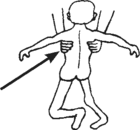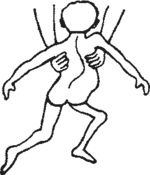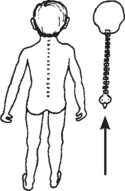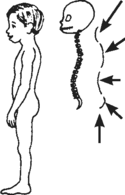Hesperian Health Guides
Chapter 20: Spinal Curve and Other Back Deformities

The backbone, or spine, is a chain of bones called vertebrae that connect the head to the hipbone. Separating each of the vertebrae is a small cushion called a disk. The backbone holds the body and head upright. It also encloses, in its hollow center, the spinal cord or trunk line of nerves connecting the brain to all parts of the body.
 Sideways curve
(scoliosis — S-shaped curve) May result from unequal paralysis of back muscles or from a hip tilt due to one shorter leg. Sometimes the cause is not known. |
 Rounded back
(kyphosis) May result from weak back muscles or from bent over position when standing or sitting. |
 Swayback
(lordosis) May result from weak stomach muscles,
from hip contractures, or from the way a child walks to make up for a weak leg or hip. swayback
|
 Sharp bend or bump in spine (tuberculosis of the backbone)
Results from destruction of one or more vertebrae by tuberculosis infection. |
Of these, scoliosis or a sideways curve is the most common serious condition. Often, however, rounded and/or swayback are seen together with scoliosis.
NON-FIXED AND FIXED SPINAL CURVES
With a non-fixed or “functional” curve there is no deformity of the vertebrae. This usually happens when the body tries to stand straight even though the hips tilt or there is other unevenness not in the spine.
 For example, a child with a shorter leg from polio will stand with his hips tilted. For him to stand straight, the spine has to curve. |
 A non-fixed curve can usually be straightened by putting blocks under the foot or by holding the child up under the arms. |
 |
Fixed or “structural” curves are deformities in the bones of the back themselves.

Note: In some cases, with time a non-fixed curve may gradually become fixed.




